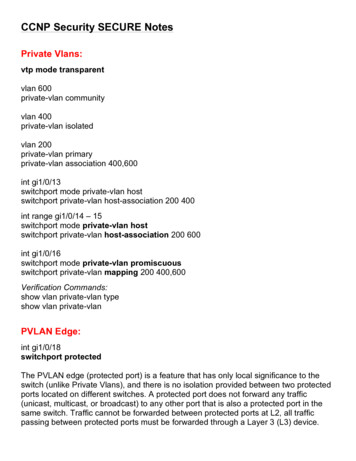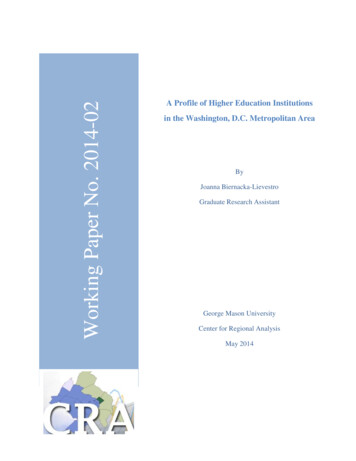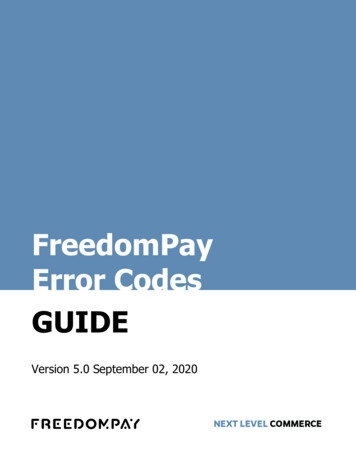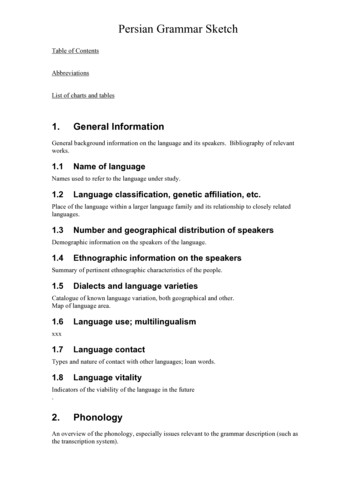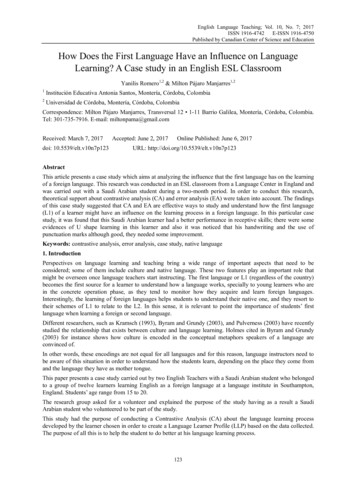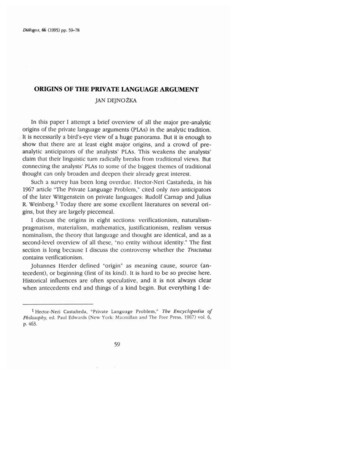
Transcription
Didlogos, 66 0995) pp. 59-78ORIGINS OF THE PRIVATE lANGUAGE ARGUMENTJAN DEJN02KAIn this pape r I attempt a brief overview o f all the major pre-analyticorigins of the plivate language arguments (PI.As) in the analytic tradition.It is n ecessarily a bird's-eye view of a huge panorama. But it is enough toshow that there are at least eight major o rigi ns, and a crowd o f preanalytic a nticipators of the analysts' PI.As. This weake ns the analysts,claim that their linguistic turn radicall y breaks from traditiona l views. Butconnecting the analysts' PLAs to some o f the biggest the mes of traditionalthought can only broaden and deepe n their a lready great interest.Such a survey has b een long overdue. Hector-Neri Casta neda, in his1967 article "The Private Language Problem, " cited only two anticipatorsof the later Wittgenstein on private languages: Rudo lf Carnap and juliusR. Weinberg. 1 Today there are some excelle nt literatures o n several origins, but they are large ly piecemeal.I discuss the ori gi ns in e ight sec ti ons: ve rificationism , naturalismpragmatism , mate rialism , mathemati cs, justi fi cationism, realism versusnomina lism, the tlleoty that language and thought are identical , and as asecond-level overview of all these, "no e ntity without identity." The firstsection is lo ng because I discuss the controversy whether the Tractatuscontains velificationism.johannes H erde r defin e d "origin " as mea ning cause, source (an tecede nt), or beginning (first o f its kind). It is h ard to be so precise here.Historical influe n ces are often sp eculative, a nd it is n ot always clearwhen an teced ents e nd and things of a kind begin . But eveiything I de-Hector-Neri Castaneda, "P riva te Language Problem," Tbe Et cyclop ed ia ofPbilosopby, ed. Paul Edwards (New York: M:-t cmilla n and The Free Press. 1967) vol. 6,p. 463.159
scribe is surely a source at the vety least; and at least my speculations asto causes or beginnings should be clear enough.My title, " . the private language argument," is misleading. Many different arguments aim to show that p tivate languages, in some sense of"private language," are impossible, in some sense of "impossible." It isunacceptable to find only one argument, to find it only in Wittgenstein,and then to look for its origins. Frege gave at least twelve such arguments, Russell seventeen , Wittgenstein e ight in Investigations alone, andQuine three.2Frege's Black Box PLA sets the stage. A Black Box PLA likens mindsto boxes whose contents are unavailable to others. Then the questionwhether ideas in different minds are the same is "unanswerable."3 Thus ifmeanings were ideas, then people could never agree or d isagree witheach other, since they could not tell if they spoke with the same meaning. Frege used the systematic invertability of meanings o f color wordsand spatial words to dramatize the absurdity of supposing that minds arelike closed boxes. It was Locke who held that mean ings are ideas;Descartes' dualism provided the framework . Russell 's early Act-ObjectPLAs, that an item intended by two people must be mind-independent,2 For Frege's twelve PLAs see: "The Thought," trans. A. M. Quinton, Mind 65(1956), pp. 299-302 (in KJemke's Essays on Frege, pp. 521 -23); three in The Foundationsof AT'itbmetic , trans. J. L. Austin (Evanston, Ill.: Northwestern University Press, 1974), pp.35, 36 a nd 37; two in 11Je Basic Laws of Arilbmetic, trans. and ed. Montgomery Furth(Berkeley: University of California Press, 1967), pp. 15-23; two in Translations from thePhilosophical \flritings of Gottlob Frege, trans. Peter Geach and Max Black (Oxford: BasilBlackwell, 1971 ), pp. 79. 120-21; two in Postl:m m ous W11'itings, trans. Peter Long et al.,ed. Hans Hermes er al. (Chicago: University of Chicago Press, 1979), pp. 133-34, 269-70;Philosophical and Mathematical Correspo11dence, trans. Hans Kaal, ed. Gottfried Gabrielet al. (Chicago: University of Chicago Press, 1980), p. 80; "On the Scientific Justificationof a Conceptual Notation," in Conceptual Notatio11. and Related Articles, trans. and ed.Terrell Ward Bynum (Oxford: Clarendon, 1972), pp. 83-86; Pasthu mous \'(/1'itings, pp.269-70. On Russell, see my "Russell's Seventeen Private-Language Arguments," Russell11/ 1 (Summer 1991), pp. 11-35.Any first-year logic student should be able to diagram many different PLAs inWittgenstein's b'Westigations. Besides Kripke's justificationist PLA , see #253/ # 298,#272/ #293, #308, #322/ #376/#378, #274 / #277/ #293-#294 , #242, #402. As to Quine, seeWord a11d Object (Cambridge, MA: MIT Press, 1960), pp. b.::, 5-8; "Ontological Relativity,"Ontological Relativity and Othe1· Essays (New York: Columbia University Press, 1969),pp. 26-27; "Facts of the Matter, " in Robert W. Shahan and Chris Swoyer, ed., Essays ontbe Philosophy of W . V Qttine (Norman: University of Oklahoma Press, 1979), pp. 155,157.3 "The Thought."60
were a positive complement to Frege's negative reductio. They haveroots in Meinong, Brentano, and medieval act theory. Russell 's laterProbability PLAs, in which teaching and learning words require a highprobability that teacher and learner "perceive" the same external events,are sutvivals of the Act-Object PLAs in his later scheme of probable scientific realism.1. The Veriftcatiotltst Backgrou·n dIn this section I shall discuss the ori gin of the verificationism inWittgenstein's principal PLA in In vestigations. Quine's naturalistic verificationism belongs to the section on naturalism-pragmatism; Frege andRussell were not veri ficationists.The first wave of scholars, notably Ayer, held that the principal PLAin Investigations is based on verificationism.4 The second wave, notablyKripk e, held that the argument is justifica tioni st, and de-emphasized itsepistemic side.5 As a new third wave, I hold that the argument is aDance of Two Veils. The first wave reported well the express word of#272. The second wave is right that a more purely semantic argum entseems implied in the pre-#202 sections. But the core of both waves isFrege's Black Box PLA ; th e example of the color red in t272 's color inversion example is an homage to Frege (see Foundations and "TheThought"). The veils are needless additions of dubious doctrines to thecore argu ment. To claim that Locke's theory is "meaningless" in anAyeiian veri fi cationist or Kripkean justificationist sense is superflu ous ifthe Black Box PLA succeeds and unwarranted if it does not.Kripke is wrong that "semantic skepticism" is more radical than epistemic skepticism. H e repeats 0. K. Bouwsma's error of long ago.Bouwsma argu ed that Descartes's evil genius hypothesis is unverifiable.But a genius might be deceiving Bouwsma and Kripke on the soundness4 Alfred Jules Ayer, "Can There Be a Private Language?, " in George Pitcher, ed.,Wittgenstein: Tbe Pbilosopbical Invest igat,:o11s (Garden City, NY: Doubleday, 1966), pp.251-66.5 Saul A. Kripke, WlittgeusteinHarvard University Press, 1982).011Rules and Private Langttage (Cambridge, MA:61
of their respective semantics. Thus both veils seem equally important totheory of meaning.6Was Rudolf Carnap's physicalist veriftcationism an antecedent of thelater Wittgenstein's? Herbert Feigl suggests Carnap as a source of the analysts' private language arguments in general:Analytic philosophers, especially those practici ng the me thods of G. E.Moore and Wingenstein, have in various ways . argued that the absolute privacy or subjectivity which for some philosophers constitutes thecriterion of the mental is an idea begotten with confusions . There arevery importam p assages in Carnap 's formulations of 1932 which anticipate in very compact form much of what has been dialectically (andpartly inde pe nde ntly) e laborated by the British analytic philosop he rs. 76Ayer adds, "And much as Wittgenstein disliked Carnap's methods,there is an echo of physicalism in his dictum that an 'inner process'stands in need of outward criteria [#580]."8 But the Hintikkas say, "To putthe main point bluntly, Wittgenstein accused Carnap of using his idea ofphysicalistic b asis language withou t . proper acknowle dgement .Wittgenstein wrote [in a letter to Schlick in 19321: · . .[Ilt is false that Ihave not dealt with the problem of "physicalism" (albeit not under thishorrible-name . '."9 The Hintikkas suggest that "Carnap never understood what precisely Wittgenstein had in mind" by this accusation.lOThus who may have influenced whom is unclear.My own suggesti on is that the o rigin is in the Tractatus. MichaelWrigley argues well that the ·origin of the Vienna Circle's verificationismcan only be in the Tractatus. 11 But there has been much dispute overwhere it might be. L. Susan Stebbing says, "This is Wittgenstein's princi-6 0. K. Bouwsma, "Descartes' Evil Genius, " Tbe Pbi/osopbical Review 5812 (Ma rch1949), pp. 141 -151. My criticism of Bouwsma must be almost as old.7 Herbert Feigl, "Physicalism, Unity of Science and the Fou ndations of Psychology,"in P. Schilpp, ed., Tbe Pbilosopby of Rudolf Cm·nap (La Salle, JN: Open Court, 1963), pp.230-31.8 Ayer, "Editor's Introdu ctio n" to Ayer, ed., Logical Positivism (New York: The FreePress, 1959), p . 27.9 Merrill B. Hintikka and Jaakko Hintikka, Investigating l f1illgenstein (Oxford: BasilBlackwell, 1986), pp. 14 5-46.lO Ibid., p. 147.11Michael Wrigley, "The Origins of Wittgenstein's Verificationism," Syntbese 78(1989), pp. 265-90.62
pie of vetifiability: the meaning of a proposition is the method of its verification. It seems to me that Wiltgenstein may have been suggesting thisprinciple . in the Tractatus . ( 4.031)." 12 Oswald Han fling says cau tiously tha t "apparently" Wittgenstein first advanced the "Verifi cationPrinciple." But Hanfli ng says that "there is no mention of verification" inthe Tractatus.13 Hanfling says that it is first menti oned in the "Theses"Friedri ch Waismann set down as Wictgenstein 's around 1930 (theTractatus was published nine years earlier). H anfling says:A ca reless reading of the 'Theses' might encou rage such misunderstanding. This is true, for example, of . 'To understand a proposition mea nsto know how things stand if the proposition is true . .' This is almostide ntica l with a passage in the Tractatus (section 4.024). But whereas inthe 'Theses' this remark is expounded in a verificationist sense, it is notso in the Tractatus .14Hanfling gives an argument for his view: "[T]his was not how the elementa ty propositions of the Tractatus were conceived . They were defined by their logical propenies and nol by any connection with velificationism."15 Perhaps so. But a Tractarian verificalionism would not con cern the logical form of an "elementaty proposition [Elementarsatzl," oreven the definition , i.e. , the individuation , of an elementary propositionas logically independent of evety other elementaty proposition. It wouldconcetn the "sense [Sinn] of a proposition." If it concerned any definitionat all , it would concern the definition of that sense. But, secondly, w hymust a Tractarian verifi cation principle be defini tional (analytic)? Could itnot be "an important k ind of nonsensical" proposition? Thus Hanfling'sargument is doubly ill-conceived. But it is H anfling's merit to have giventhe only argument against verificationism in the Tractatus. The onlyother "ground" for this virtually universal view is that the word "verificationism" is not handed to us on a sil ver platter there.Mau rice Cornforth's argu ment for Tractarian verificationism is decisive. Cornforth says the veri ficat io n principle "l ay at the basis ofL. Susan Stebbing, "Logi cal Positivism a nd Ana lysis," Annual PhilosophyLecture , Henriette Herz Trust (Haske ll Ho use, 1933), p. 16 and p. 16 n. 1.13 Oswald Hanfling, Jnrro du ction to Hanfling, ed., Esseruial Readings in Logica lPositivism (Oxford : Basil Bbckwe!J , 1981), pp. 3, S-6.14 Introdu ction ro Essential Readiugs, p. 6.15 Ibid . See also Hanfling . Logical Positivism (New Yo rk: Columbia UniversityPress, 198'1), pp. 11 -12.12 See63
Wittgenstein's Tractatus . "16 Cornforth argues in effect that the Tractariandistinction b etween factual and n ecessary truth presupposes the picturethory of meaning, and the picture theory of meaning presupposes theverification principle .17 Cornforth observes that in the Tractatus, statements which are n eithe r verifiable in te rms of facts nor tautologously ttueor false are ipso facto condemned as nonsense. 18 I endorse this powerfulargument. Moreove r, this distinction among factually verifiable, tautologous, and nonsensical propositions is the basis of the logical positivists'verificationism in their heyday. It seems inescapable that the Tractatus isthe origin o f their verificationism, as well as of that of Investigations.Cornforth goes wrong only when h e says that when Wittgenstein realizedthe error of "tryi ng to w histle w hat you cannot say," he abandoned theTractarian verification principle and replaced it with the "meaning is use"approach o f Investigations. Cornforth does n ot realize that that is then ew verificationism , expressly stated in Investigations #353. It is worthnoting that the Tractatus a lready connected its own notions of sense anduse.I suggest that the followingTractatus sections collectively implyvetificationism:T 2.221 What a picture rep resents is its sense (Sinn).T 4.021 A proposition is a picture of reality; for if I unde rsta nd (verstebe)a p roposition , I know (kenne) the situa tio n that it represents.T 4.022 A proposition shows its sense (Sinn). A proposition shows howthings sta nd if it is true . And it says that they do so stand.T 4.024 To understand (ve rsteben) a proposition means to know(wissen) what is the case if it is true . [This is the section Hanfling citesas not verifica tionist.] ·T 4.03 A proposition communicates a s iruation ·to us, a nd so it must beessentially connected with ·t he situation .T 4.031 . Instead of, This propositio n has such and such a sense'(Sinn) , we ca n simply say, 'This proposition represe nts suc h a nd su ch asituation'. [This is the section Ste bbings cites.]T 5.156 . We use probability only in default of certainty- if our knowledge (kennen) of a fact is not indeed complete, but we do know(utissen) something aboLH its for;m. (A proposition may well be an inl6 Maurice Cornforth, Ma1'xism and tbe Linguistic Pbilosopby (London: Lawrence &Wishart, 1965), p. 111.17 Ibid. , pp. 114-116.18 Ibid. , p. 116.64
complete picture or a ce n tin silu t tio n. 1Ju1 iL is always a complete pic ture of something.)My argument is simple. What is verificalionism? It is a co nnectionbetween epistemology and meaning such that a statement has meaning ifand only if we know how to tell it is ttUe (strong form), or there can bepossible evidence that it is true (weak form). D o we find such a connection in the Tractatu s? Yes, we do. In fact, w e find two such connections.We find the strong form, where we fully understand a statement'smeaning if and only if we know its truth conditions, in T 4.021 and T4.024. This concerns the pi cture th eory of meaning . We also find theweak form in T 5.156 , where a given statement can be meaningful butonly probable because it only parti all y pictures the situation, S, in whichwe are interested . Such a statement is meaningful on ly because it fu llypictures some other situation ,such tha t we know the truth conditionsfor s and s is th e evidence for S. The wea k form presupposes thestrong fo nn , just as it sllould .19I also find a Black Box-Verifi cationist PLA in the Tracta/us. Namely: Imust und erstand statements about other minds in terms of the states ofaffairs which I know ; but such states of affairs could only concern thebehavior of others.20 Here other minds are behaviorislically viewed, but Ialone seem to be the solipsistic view ing "public." Not surprisingly, thisPLA is close to Ayer's Verificalionist PLA in Lang uage, Truth and Logic. 21Likewise, Carnap 's Aujbau and its inspiration, Russell's E: .:lernal World,explicate other minds in terms of bellaviotistic appearances of others tooneself, on ly after first explica ting bodies in terms of primitive data.(Russell 's E'A.·fernal Vv'o rld is physicalistic in that its sense-data are mindindependent physical events.)22 The forerunn er of all these is Hume'stheoty of meanings as ideas which are derived from sense-impressions.All have tendencies toward behaviorist neutral monism.Raymond Bradley thinks the Tractatus is physicalist. I tend to followthe Hintikkas in thin king it was written w hen Wittgenstein was a phe-s-,19 The a rgument was that \Vithout strong verifiability, one would not understandwh:lt one was weakly verifying. But Neurath and Ca rn:1p denied that any s tatementsabout the world were completely verifiable.X Apply T 5.5562 and T 5.5563 to "Smith now feels a toothache."21 Ay(.·r, Lrmgttage, Trutb aud Logic, Second Edition (New York: Dover, 1952). pp.129-32; sec p. 122.22 See the relevant essays in Russell's Mysllcism a11cl Logic of the same time.65
nome nalist. But o ffi cially it takes no sides o n what objects are. Even so,in it ordinary talk of bodies sure ly must be analyzed in tem1s of objectsbefore ordinary talk of other minds can be, since selves are definitely notgiven as objects, and surely the conte nts of other minds are not either.This brings the Tractatus Black Box-Verificationist PLA closer to that inInvestigations. If if I am wrong about that, Investigations' vetificationistphysicalism and Carnap 's methodological physicalism are little improveme nt on Wittgenstein's earlier verificationist phenomenalism and Carn ap's earlier methodological phenomenalism in explicating other mindsas communicators. For the re can be as littl e genuine communicationamong mere physical be havio r panerns as there can be among me reconstructions of phenomena. Julius Wei nberg noted that about Carnap;Thomas Re id made much the same point about Hume.2 3 Carna p a ndRussell saw the problem and moved to an accepta nce of other minds, respectively as explanatoty p osits and as probably real structures. Wittgenste in and Hume did not. Neither h as Quine. Even the 1992 Quine's"irreducibly m ental ways o f grouping" "n eural realities" (Davidsoniananomalous monism) a re no t communicators. What did his way ofgrouping n eural events tell he r way o f grouping neural events over thebackyard fence yesterday?Cornfo rth's decisive argume nt tends to equate the o rigi ns of Tractaria n verificationism with the origi ns of the picture theory of meaning:Plato's Theaetetus 201-2, and behind it, Pam1en ides.2. The NatJlraltst/ Pragtnaltst Backgrou11dQuine calls himself a naturalistic verificationist a nd a pragmatist.Admitting a he ritage fro m Peirce, Quine cites Dewey and Wittgenstein asanticipating his PLAs, and a lso cites a British heritage. 24 Quine mig ht23 Julius R Weinberg, An B:ami11ation. of Logical Posilivism (Lo ndo n: Kegan Pau l,Trench , Trubner, & Co., 1936), pp. 215 , 224. Thomas Reid notes that Berkeley, and byextension Hume, face much the same problem. See Reid, Essays 0 1 the IntellectualPowers ofMan (Cambridge, MA: MIT Press, 1969), pp. 179, 199.24 "Ontological Relativity," pp. 26-27; "Facts of the Matter," pp. 1 SS, 157; Theoriesa11d Tbi11gs (Cambridge , Mass.: Harvard Un iversity Press, 1981), p . 192. See also"Comment on Parsons," in Robert B. Barrell and Roger F. Gibson, eds., Perspectives onQuine (Oxford: Basil Blackwell, 1990), p . 292. On Peirce, see Quine, "The Pragmatists'Place in Emp iricism," in Robert]. Mulvaney and Philip M. Zeltner, eds., Pragmatism: ItsSources and Prospects (Columbia: University of South Carolina Press. 1981), pp. 23-37.66
have mentioned also the pragmatic side of Carnap 's methodologicalphysicalism, and j eremy Bentham's theory that words are tools. Quinedoes cite Bentham's contextualism, and a lso Jo hn Horne Tooke'smethodological replacement of ideas with words.The pragmatic side of Wittgenstein is well -known . 25 Wittgenstein mayhave lea rned from the p ragmatism in Frank Ra msey's later works. 3SPragmatic aspects of Piero Sraffa's Marxism may have been an influence.But I agree with H. S. Thayer that since Wittgenstein's conversations withRamsey and Sraffa were unrecorded , any evidence of pragmatic influencein the text of Investigations must remain circumstantiaJ.27 William James'sPsychology was for a time the only book Wittgenstein had in his rooms.1BWhile Peirce and pragmatism are not listed in its index, its philosophy ofmind is largely instrumentalist.29 It may never be clear how much its instrumentalism influenced Wittgenstein .The 1927-59 Russell's theo1y of knowledge is largely naturalistic; thisaffects his Social Language and Probability PLAs.ll This seems to beRussell's accommodation of what he deemed valuable in pragmatism after he rejected the pragmatic theo1y of truth .While Frege intended his formal notation to have great utility in theway of rigorous proof, such an intention ca nnot be tied to classic pragmatic philosophers. Still , rigor's dem and for public confi rmability doeslink Fregean "pragmatism" to public notations.See john P. Murphy , Prag111alis111: From Peirce lo Davidso11 (Boulder, CO: Westview,1990), pp. 91-92, quoting Quine.25 See e.g. K. T. Fa rm, \'7illgenstein's Conception of Pbilosopby (Berkeley: Universityof California Press, l 97 1), pp. 46-17, 84-85: P. M. S. Hacker, l11sigbt and lllt1sion.(London: Oxford University Press, 1972) pp. 123-24, 259; Richard Ro rry, Philosophy andtbe Mirror of Nattl1·e (Princeton, Nj: Princeton University Press, 1979), chapter 6.26 H. S. ThJyer, Meaning and Action: A O ·itical Histo r)' of Pragmatism (Ind iana polis, IN: Bobbs-Merrill, 1%8), pp. 305, 309-13.T7 Ibid.28 Ibid., p. 3]3, citing G. H. Von Wright's "Bibliographical Sketch" in Norma nMalcolm, \rlilfgenstein, p. 15.29 George A. Miller, Introduction to William James, Tbe Principles of Psycbology(Cambridge, MA: Harvard University Press,1983), p. .:vii .30 See Ned Garvin, "Russell 's NJturrdistic Tu rn, " Rt ssell l l/1 (Summer 1991), pp.36-51, and "Russell's Seventeen Private-LanguJge Arguments," pp. 25-29.67
Camap attributed his methodological physicalism to Neurath, whomhe said was influe nced by Buchner and Haeckel.31 But Neurath praisedMarx for his behavioristic approach.3 2 Neurath's background also included Marx's pragmatic the01y of ttuth. Neurath's own theory of truth ispragmatic and behavioristic. It is con cerne d with how well sentences cohere into a theory, and theories for Neurath are physical markings concerning the behavior of the physical world.Peirce's theoty of meaning emphasized the socia l and the objective.James was concerned mainly with tmth. But James's views were muchcloser to Peirce's than James's more b ombastic slogans suggested. Deweyhad no systematic the01y of meaning, but his very Pe ircean remarks onmeaning strongly support Quine's program. The pragmatists made manyclaims about their own views' origins, which 1 cannot mention here. 33James's neutral monism was the main influence on Russell's neutralmonism in 1921.The strong interplay between social action and linguistic meaning inMarx and Enge ls delives from Hegel. Hegel was a pragmatist in that hecombined both practical and theoretical considerations into his dialectic.34 Hegel strongly influenced the earl y Dewey and so, indirectly,Quine.353. The Materialist BackgroutulQuine follows Carnap in advocating methodological physicalism. Butmost 19th-centwy materialists were al ready methodological materialists,according to the great 19th centwy historia n of matelialism, Frederick3l See Rudolf Carnap, "Intellectual Autobiography," in Tbe Pbilosopby of RudolfCarnap, pp. 24, 51.32 Otto Neurath, "Sociology and Physicalism," in Logical Positivism, pp. 306, 309-10,315.33 Meani1 g and Action, p. 5; see pp. 314-21.34 Ivan SoU, An Jntrodu.ction to H egel's Metapbysics (Chicago: The University ofChicago Press, 1969), pp. 6-7; see pp. 9, 28, 30, 39, 43-45.35 Walter Kaufmann, Foreword to An lntt·oduction to Hegel's Metapbysics, p. x. SoU,pp. 76-77, compares Hegel on epistemolology to Neura th, "Protokollsatze," inE1·kennt11is 3. p. 206 (Soli's trans.) ·and to Quine, Word and Object; Enc. , sect. 41, Zl.See also .Meani1 g and Action, pp. 165-67, 173-74, 184-85, 422, 442, 461-63, 521.68
Lange.3S Maurice Cornforth and Keith Campbell find the middle-to -laterWittgenstein congenial to matetialism.37 Menill B. and jaakko Hintikkadeem him a physicalist in some fai rl y nondesctipt sense hard to discernfrom mere nonmentalism.38Wittgenstein and Carnap may have been inspired by Marx's materialistic behaviorism. Wingenstein may have learned about Marx fromSraffa. Wittgenstein also read some Marx. He read some of Das Kapital,in which Matx says language is a "social product."'l We can also go fromCarnap through Neurath to Marx . Marx held that language and consciousness are essentially social.41 This view is easily traced from Marxand Engels through Feuerbach 42 to Hegel's Ph eno m enology.43 TheMatx-Hegel society-language-consciousness nexus has deep roots inHobbes44 and Plato. 453SFrederick Lange, The History of Materialism (New York: Harcourt, Bra ce, & Co.,1925), Boo k 1 Continued (repaginated). p. 161: see pr. 223 , 1.97. 312. 332, 337-39, andRussell's Introduction, p. xix .37 Mar·xism a11.cl the Linguistic Philosophy, p . 172; Keith Campbell, "Materialism,''The Encyclopedia of Philosophy, vol. 5. p. 184.38 Investigating \rliugenstein, p. 165. Susan Easton, Hum anist Mar: .:ism and Willgensleinian Social Philosophy(Manchester. England: Manchester University Press , 1983), pp. 131 , 133.tl() Ibid ., p. 139. citing J. Moran, "Wittgcnstein and Russia, " New Left Review 0972),pp. 85-96; see Karl Marx , Capital, ed. fre derick Engels, trans. Samuel Moore an dEdward Aveling (New York : International Publishers, 1967), Vol. 1, p . 79.41 Marx, The Germa11 Ideology: Pa rt I, trans. and ed. S. Ryazanskaya, in Robert C.Tu cker, ed ., The Ma rx-Engels Reader, Second Editio n (New York: W. W. Norton, 1978),pp. 158-59; Marx, Economic and Philosophical Mar111 scr'ipts of 1844, in The Marx-EngelsReade r, pp. 85-93; Marx, Gnmdr·isse: Foundations of the O·ifique of Polilical Economy,trans. Martin Nicolaus (New York : Vintage, 1973), pp. 163, 490; Marx and FriedrichEngels, MaHifesto of the Com munist Party, English ed. of 1888, ed. Engels, in The MarxEngels Reade1·, p. 489; Engels, Dialectics of Nalttre, trans. and ed. C. P. Dutt (New Yo rk:Internatio nal Publishers, 1940), pp. 279-85.42 Engels, Ludwig Feuerbach aud !he Outcome of Classical German Philosophy, ed.C. P. Dutt (New York: Interna tional P b lishers, 1941), pp. 24-25; Eugene Kamenka, ThePhilosophy of Ludwig Feue1'bacb (London: Ro utJedge & Kegan Paul, 1970), pp. 121 -22.43 On Marx 's Hegelianism, see john Plamenatz, Karl Marx's Conception of Ma n(Oxford : Clarendo n Press, 1975), pp. 70-73. On Feuerbach's early Hegelianism, seeMarx Wartofsky, Feuerbacb (Cambridge, England: Cambridge University Press, 1977),pp. 233-34; see also pp. 182-83, 239.44 MarLin A. Bertm:: n f:tvorab ly o 111parcs llo bbes with Wittge:·nstei n on the socialnature of language, "Sem:Hllics and Po litic tl Theory in Hobbes," Hobbes Studies 1(1988), pp. 141-42.45 I quote some Plato in section 7.69
In French materialism, Bonald resembles Hegel in emphasizing theorganic social -linguistic nature of all human thought. 46 Marx and Engelspraise French materialism as the progenitor of socialism and communism.They cite Lamettrie , specifically Man Machine , as part of this tradition.47There, as Lange notes, Lamettrie cites the early church father Amobius'sSocial Language PLA (thinking and meaning are impossible to one without a public language) from ca. 300 A.D.:Let us then imagine a place dug out in the earth, fit for dwelling in . Tothis let there not come any sound or cry whatever, of bird, of beast, ofstorm, of man . Now, . let us receive some one born to dwell there,where there is nothing but an empty void . Let us . provide a nursealso . . , ever silent, uttering not a word . Let us suppose, then, that hegrows up, reared in a secluded, lonely spot, spending as many years asyou choose, rwenty or thiny . Will he not, then, stand, with less witand sense than any beast, block, stone? Will he not, when brought intocontact with strange and previously unknown things, be above all ignorant of himself? . Is this the learned [Platonic] soul which you describe,immo rtal, perfect, . . endowed with the loftiest powers of reason[?] 48The theology of Arnobius is that pace Plato, human reason, and eventhe human soul, are far too weak to exist apart from communal language-teaching.49 Thanks to Marx's and Engels' specific praise of ManMachine, it would seem that they not only would have wholly approvedof Arnobius's Social Language PLA, but actually knew of it. Arnobius46 George Boas, French Philosophies of the Ro;na111ic Period (New York: Russelland Russell, 1964), pp. 72-74, 74, 76·77, 80, 83.47 Marx and Engels, The Holy Family: Or Criliqt. .e of Critical Critique, trans. R.Dixon (Moscow: Foreign Languages Publishing House, 195 5). pp. 169, 175-76.48 Arnobius of Sicca Veneria (Africa), Tbe Seven Books of Arnobius Adversus Gentes,trans. Hamilton Bryce and Hugh Campbell, eds. Alexander Roberts and JamesDonaldson, Ante-Nicene Librmy: Translations of tbe \flrilitlgs of the Fathers Down toA .D. 325, Vol. 19 (Edinburgh , Scotland: T. and T. Clark, 1871), pp. 86-90 (Book 2,para. 20-23); Ermin F. Micka, The Pmblem of Divine Anger in Arnobius and Lactantius(Washington, D.C. : The Catholic University of America Press, 1943), p. 49. See: JulienOffray de Ia Mettrie (Lamettrie) (1709-51), Man a Machine, trans. various (Chicago:Open Court, 1912), p. 113; see pp. 103-4, 103-14; The History of Materialism, Book 1Continued (repaginated),
Mar 07, 2020 · the private language argument," is misleading. Many dif ferent arguments aim to show that ptivate languages, in some sense of "private language," are impossible, in some sense of "impossible." It is unacceptable to find only one argument, to find i
